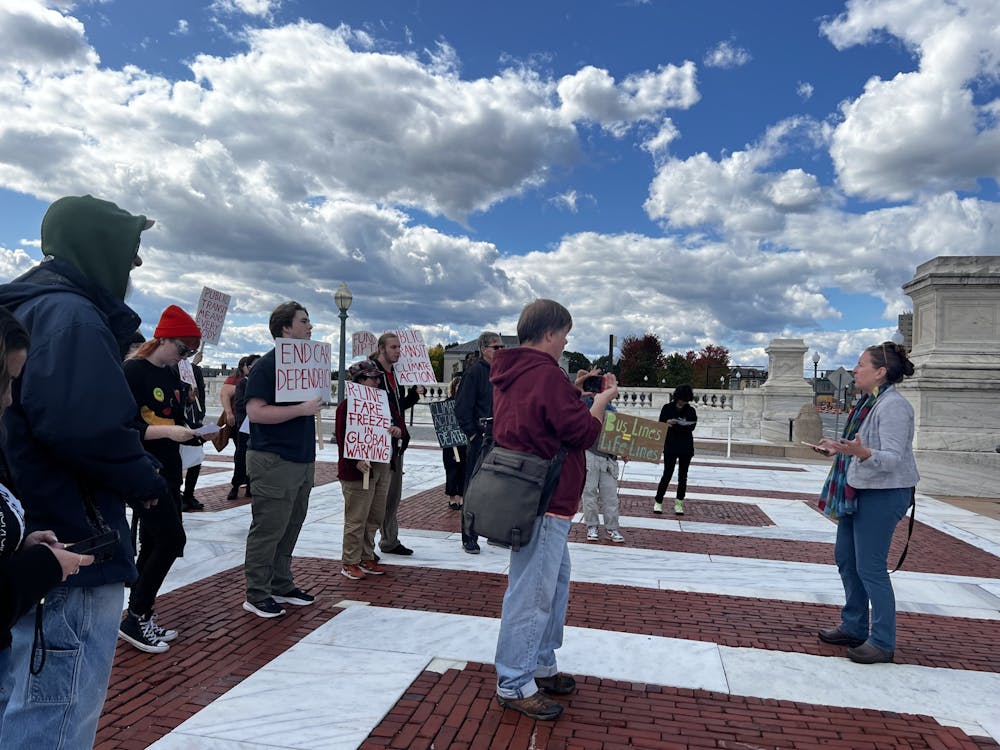Demonstrators gathered outside the Rhode Island State House Monday afternoon to protest the end of the Rhode Island Public Transit Authority’s fare-free R-Line pilot program.
The program, which was intended to run from Sept. 1, 2022 to Sept. 30, 2023, allowed any rider to board the R-Line, RIPTA’s highest-ridership bus line, for free instead of paying the $2 fare. The pilot program was funded by $2.5 million of one-time federal American Rescue Plan Act funds set aside by the Rhode Island state legislature in 2022 and was extended through the end of September this past summer.
Cristy Raposo Perry, a representative for RIPTA, directed The Herald to a press release from Aug. 9.
“The actual cost of this pilot program exceeded this allocation,” the press release reads. “Given the annual cost of this pilot and RIPTA’s current budget outlook, it is not financially feasible for RIPTA to continue this program indefinitely.”
Dally Dixon, an environmental studies major from Rhode Island College, organized the rally in collaboration with Rhode Island Transit Riders, Sunrise@Brown and the Rhode Island College Environmental Club.
“I see public transit as the number one first step in dealing with the climate crisis,” Dixon said. “The fossil fuel and automobile industries are the driving factors of climate change, and public transit is the key to remedying that. So here we are.”
According to Dixon, participants were advocating for full funding for RIPTA on state and federal levels, including a reinstated fare-free R-Line. They also demanded better pay for bus operators and called for a solution to the RIPTA’s increasing fiscal cliff.
RIPTA is currently $33 million in debt due to financial losses sustained during the pandemic, Dixon said. Transportation authorities in Rhode Island are struggling to revive ridership even as the emergency relief funding provided by the federal government is close to running out, they added.
By 2024, RIPTA’s deficit is projected to reach $40 million, jeopardizing the transit system’s future, Dixon said.
“There's currently no solution for this on a state level,” Dixon said. “We’re in trouble.”
Senator Meghan Kallman PhD ’16 (D-15), who was the original sponsor for the fare-free R-Line in the Rhode Island Senate, also spoke at the rally.
“Transit funding is at the intersection of a whole bunch of things—climate, sustainability, emissions reductions, transportation, justice, housing, accessibility and mobility,” Kallman said. “The data has really shown that free fare arrangements boost ridership in small systems like ours.”
She emphasized the importance of creating a long-term funding model, rather than a “patch,” to secure RIPTA’s future.
“Аt the end of the day, this is something we need to have a plan for consistently,” Kallman said. “So that two years from now, we're not back in the same boat going, oh crap — how do we fund this bus system?”
Former state Senator Robert Kells, vice chair of the RIPTA board of directors, encouraged protesters to “keep up the good fight.”
“It's very important that you stay in touch with your legislators,” Kells said. “Make sure that they understand the way you feel and how important (public transit) is to this economy, to transit riders, to people in the state of Rhode Island — we cannot lose any of it.”
Also in attendance were members of the Providence Urbanist Network, the Kennedy Plaza Resilience Coalition and Direct Action for Rights and Equality.
Public school teacher Aaron Hill, a member of PUN, said he was attending the rally in hopes that the state would recognize the fare-free program’s impact, both environmental and personal.
“I take the R-Line a couple times a week at least, certainly when it's fare-free,” said Hill, who is a resident of Providence but teaches in Massachusetts. “A public school teacher doesn't make a whole lot of money, so those couple bucks on just transit make a huge difference.”
According to a RIPTA press release from March 2023, the R-Line saw a 40% increase in ridership in the pilot program’s first six months.
“The first half of the program has shown that when we invest in our transit system, positive results follow,” RIPTA CEO Scott Avedisian said in the release. “The popular R-Line service, free-fare pilot and other elements of our Transit Master Plan will contribute to building a world-class transit system that serves all Rhode Islanders.”
The Transit Master Plan is part of the Long Range and Metropolitan Transportation Plan released in 2020 by the Rhode Island Department of Administration Division of Statewide Planning. Other initiatives include RIPTA’s proposed construction of a new transit hub at the intersection of Dorrance and Dyer streets.
Randall Rose, a representative from the Kennedy Plaza Resilience Coalition, spoke at the rally and called for RIPTA to redirect efforts on the new transit hub toward revitalizing the Kennedy Plaza hub and keeping the R-Line fare-free.
Terri Wright, Tenant & Homeowner Association staff organizer for DARE, raised concerns about how the reinstatement of the fare would affect disadvantaged communities in Rhode Island.
“We’re thinking about folks with disabilities, about our unsheltered and homeless communities,” Wright said. “When programs are taken away, it’s a slap in the face.”
“A consistent source of funding would enable us to realize this whole plan, not just try to keep the train on the tracks for the next year, two years, three years,” Kallman said. “Transit should exist because it is something that we need in cities. It's part of what we pay taxes for — infrastructure that meets the needs of people.”

Anisha Kumar is the senior editor of community and standards of The Herald's 135th editorial board. She previously served as a section editor covering University Hall and international student life. She is a junior from Menlo Park, California concentrating in English and Political Science who loves speed-crosswording and rewatching sitcoms.





